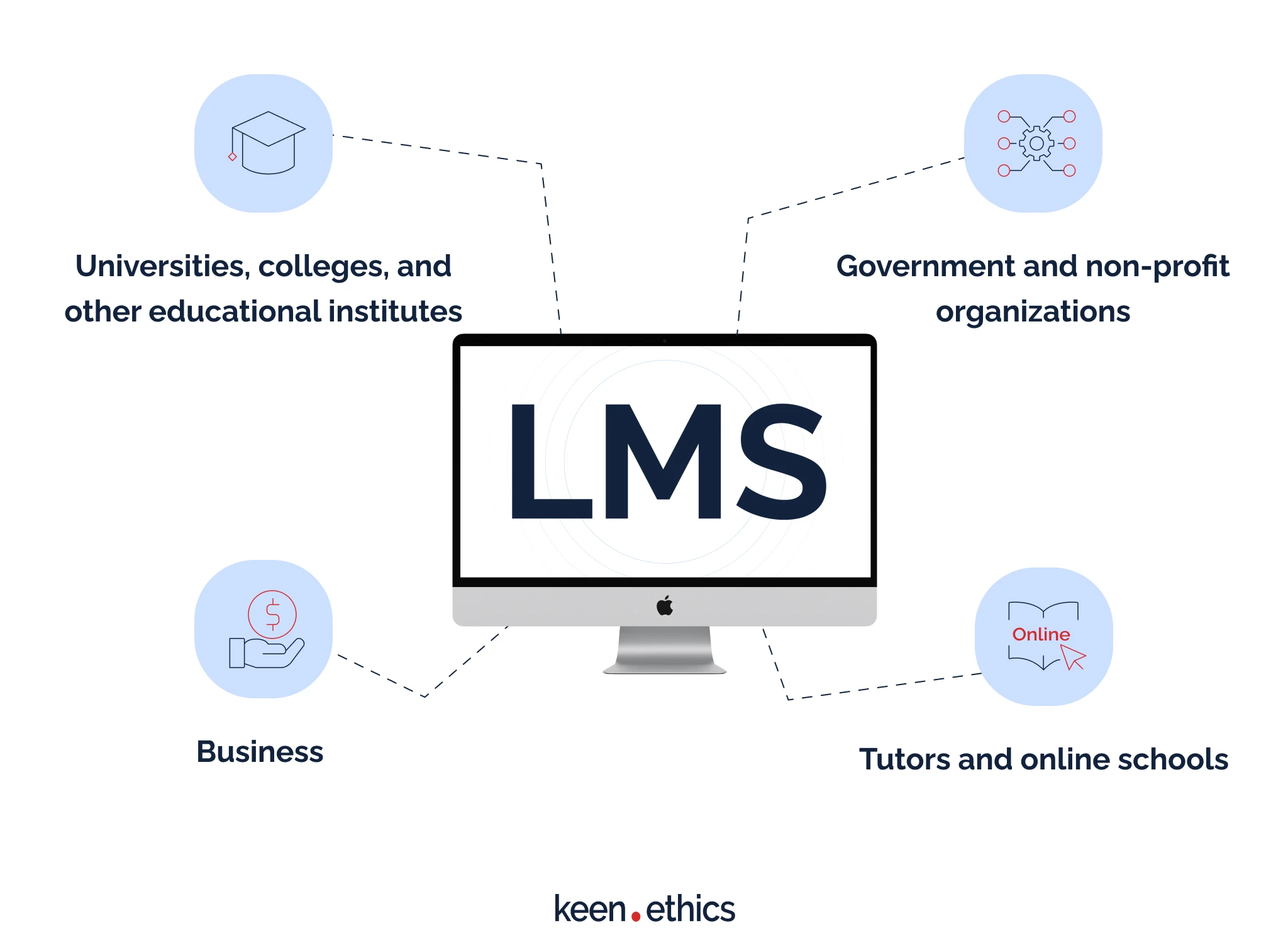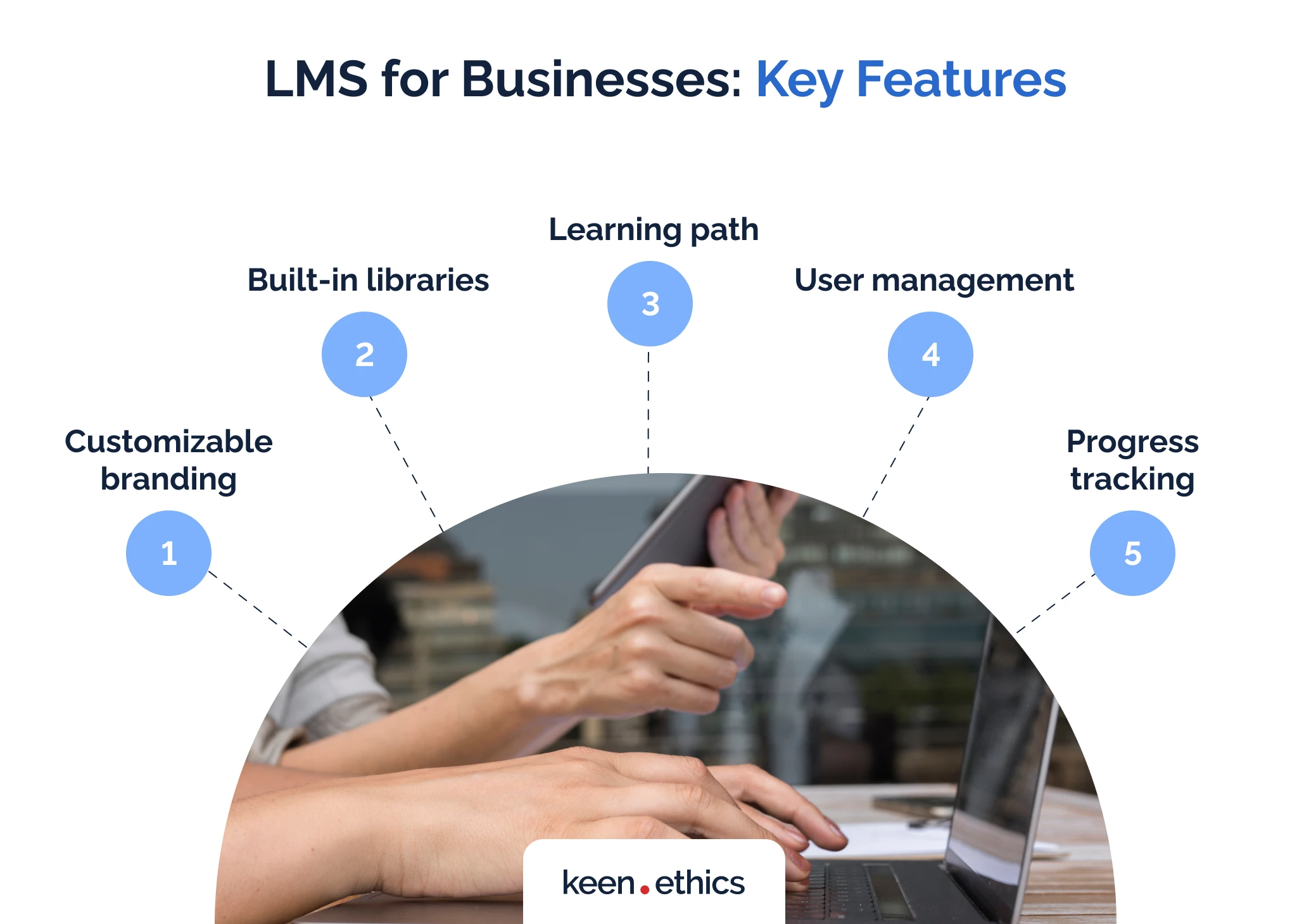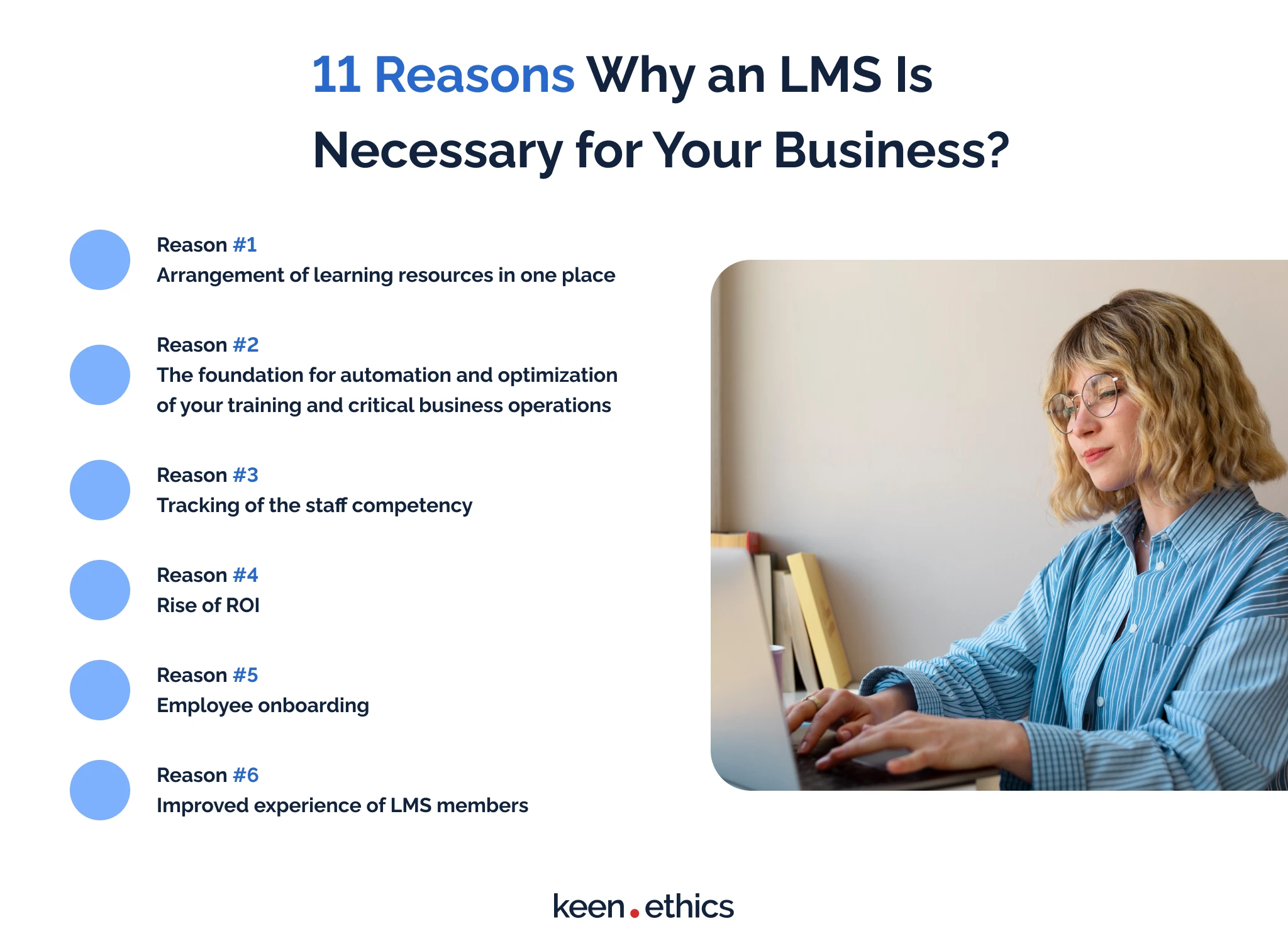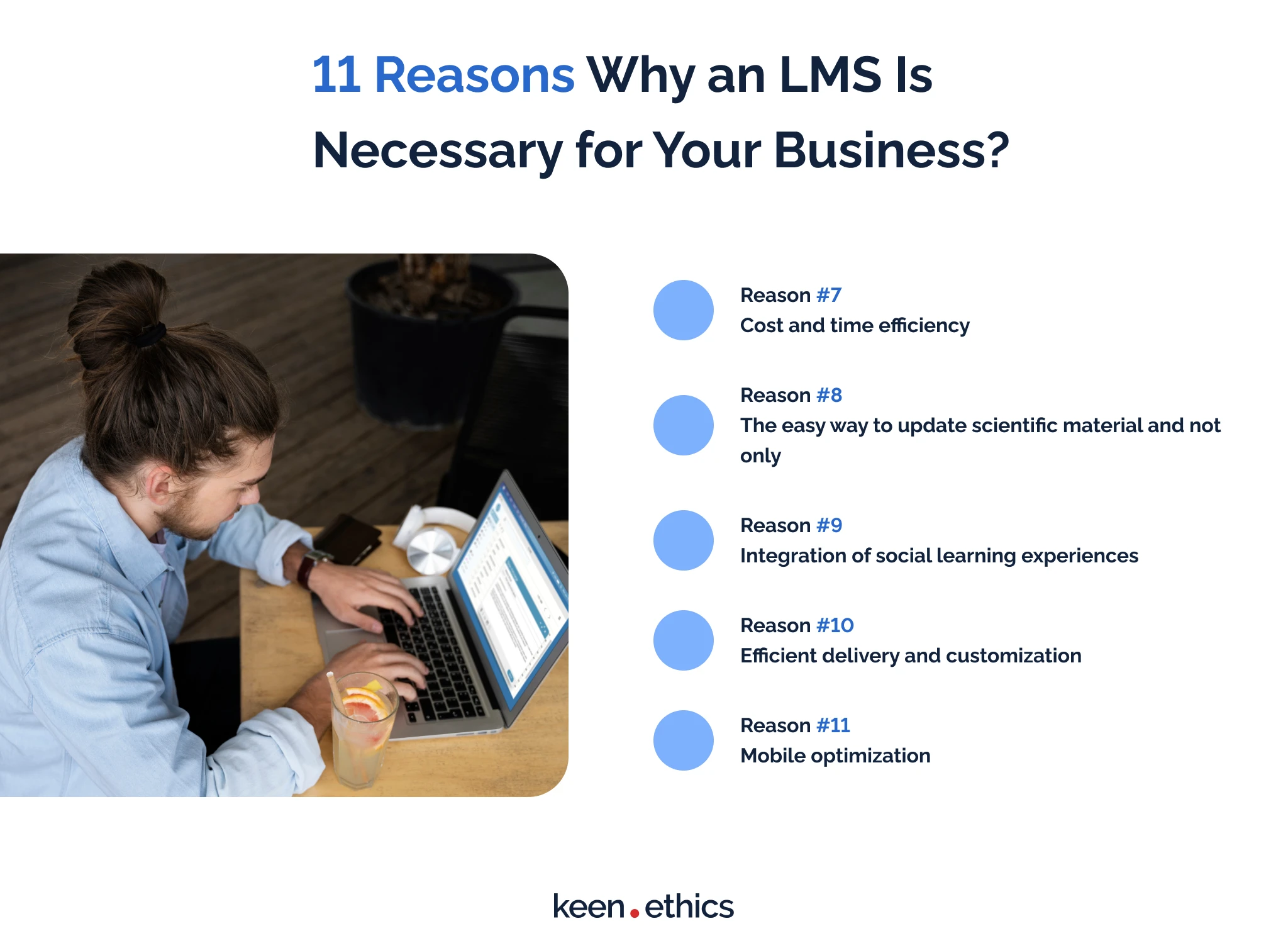LMS for companies, LMS for businesses – boring name or trend?
In our blog, we’ve written a lot about LMS and its usage in healthcare, education development, business, and other industries. Maybe you consider it to be a trite issue. But it’s not. Today, I’d like to tell a bit about another specificity of the learning management system and focus on subtopics we might have only briefly explored in our blog articles. If you want to review your internal educational processes in your business, create a new LMS, or employ an existing one, you’ll find helpful tips.
Who Uses an LMS?
You may ask – who can benefit from using LMS? The practice shows that LMS is a choice for different industries and users. It presents no limits. Whether healthcare, banking, agriculture, or education, teaching and learning are critical everywhere. Consequently, controlling and establishing all related processes is efficient. It gives benefits to everyone. Using LMS wisely, everyone can save time and costs and increase revenues and performance of various roles.
Let’s view who can take much of the corporate learning management system. However, note the list isn’t limited and can be supplemented.

Universities, colleges, and other educational institutes
LMS is used in schools for granted. It’s a helpful tool to manage, control, and advance courses daily. Instructors shouldn’t spend time on repetitive processes. Instead, they deliver much more exciting learning to the learners oriented on their interests and preferences in education. LMS isn’t a new but a beneficial way to grow the tech-savvy generation with better learning results and engagement in learning.
Government and non-profit organizations
Using LMS, governments or non-profit organizations can provide internal training for the staff and external training for the public. The employees of organizations are in charge of distributing funds appropriately. Corporate training LMS can help solve the issue imperatively using tech and AI solutions. LMS solutions help authorities and non-profit organizations use modern technologies to rely on data analytics and analyze the efficacy of future projects.
Business
It’s the easiest way to improve corporate learning in different departments. The tool allows for the quick and effective onboarding of new staff and their advancement in career paths. LMS helps business owners save money on travel, accommodations, meeting room rent, and other event costs. The online material can be constantly updated, modified to modern learning standards, and delivered to the employees. By employing LMS for business, managers can track who’s completed the course, the quality of their completion, and gaps in understanding. Staff development is part of a business growth strategy. Based on the report, admins can find ways to improve the employee training program.
Tutors and online schools
Integration of educational material into one platform is an advantage. It’s far easier to manage courses, classes, and learners’ achievements and get quick reports about queries that interest instructors. Another way schools can increase profits is by selling the programs with membership programs or other pricing plans.
Read our recent articles, and you’ll find the answer.
What Is an LMS for Companies?
As a business owner of a big or small corporation, you certainly understand the need to be one step further in a competitive market. With constantly developing learning standards and strict timeframes, it’s pretty challenging to keep up with the processes in different departments. But LMS can help you in the learning segment to make your employees competent professionals in their domain. I believe you know what LMS for companies is. But if, in brief, it’s an excellent way to control and deliver proper training processes inside your organization. With regular updates of training modules, you can retain staff knowledge so that they can at any time contribute to the growth of your business.
Without further ado, here are the following benefits LMS presents to businesses:
• accessible and flexible training for every employee;
• one place for all the educational content;
• the schedule suitable for everyone;
• cost- and time-efficiency;
• regular improvements in the quality of training;
• tracking staff progress;
• protection of the client’s data;
• straightforward onboarding;
• KPI improvements through training employees;
• employee satisfaction and retention;
• improvements in customer service and sales.
LMS for Businesses: Key Features
Every customer may have a different vision and requirements about LMS. But in fact, the features of LMS should correspond to the basic needs of the system, which are to manage learners and courses and evaluate the performance of the ongoing training process.

Let’s view the main LMS features we can focus on in the effective LMS for business:
Customizable branding
To make your training customizable with prospects in the future, you should focus on the ability to modify the view of the platform. At least you can create a unique design and add a logo so that users recognize the company.
Built-in libraries
You needn’t create the content library independently since many systems have already taken care of that.
Learning path
A similar feature allows you to create detailed stages of your program. It enables everyone to follow the sequence of learning. Besides, you can deploy specific criteria for evaluation, set course deadlines, and update the course units.
User management
User management lets you invite users, edit them, divide them into groups and departments, and assign specific roles.
Progress tracking
The ability to assess employees’ performance and analyze training efficiency promptly is critical. It helps prevent barriers like lack of interest, low learner engagement in courses, and no correspondence to their expectations and needs.
11 Reasons Why an LMS Is Necessary for Your Business?
Wise use of resources is a priority for every company culture. While some businesses regularly dive into emerging tendencies, others doubt. It’s not as easy as it may seem. Before choosing the right solution and integrating it, every business should weigh its opinions, workforce, and resources. LMS for businesses is a solution worth examining. You can take much of LMS if you fully understand its relevance for your business.

So, let’s view the reasons to invest in a solid LMS.
Reason #1 Arrangement of learning resources in one place
Before enterprises began employing LMS for corporations, all training content and schedules were scattered and hard to find and control. Now, with LMS, you have all the content in one place, and it’s easy to deliver it to the right employees at the proper location and device. Another benefit is the easy integration of LMS with other critical business software.
Reason #2 The foundation for automation and optimization of your training and critical business operations
LMS helps you follow specific operations that streamline daily functioning. These processes are integral to the company’s smooth operations, including sales, customer services, human resources, IT, finance, and others. Fully functioning LMS formalizes the learning processes, preventing your business from inconsistent training sessions. It’s a great tool that allows new and old employees to easily understand the operations at hand and be equipped to achieve the company’s goals.
Reason #3 Tracking of the staff competency
Understanding the competency of remote employees and improving their knowledge and skill gaps is critical. LMS presents insights into how well staff can perform individually and with colleagues. The L&D team is in charge of bridging all existing barriers. With LMS systems for business, you can create accessible tests and courses for knowledge assessment. They help set course completion rates and determine needed training.
Reason #4 Rise of ROI
Training programs and sessions usually include costs for premises, trainers, transport, and others. Additionally, expenses are recurring when new employees join or new requirements are required. For this reason, if the company regularly wants to maintain employee development, LMS is a good tool giving many benefits in the long run. Repeated material usage, regular updates when needed, and access to courses from any time and location are only part of the benefits compared to traditional training.
Reason #5 Employee onboarding
Managers sometimes engage old employees in training new employees, thus taking away their time and resources. It’s not a good approach, though. Consequently, a well-organized onboarding process boosts productivity and minimizes the rate of staff turnover. But how can you create a fully compatible orientation course, and is this easy? With LMS for corporate training, sure. A customizable training platform offers you many features you can employ. It can help you write good material, involve the content of any format, and access professionals and other ready-made training courses. With LMS, you can adapt, enhance, update, and re-use the same training material for each group of new employees.
Reason #6 Improved experience of LMS members
A learning management system for businesses can set up and deliver members exciting content on various topics. Due to time and space limits, traditional learning can be challenging to cover many issues. However, using LMS allows you to choose topics and learning paths for your employees and give them the most valuable and critical data for their positions.

Reason #7 Cost and time efficiency
LMS learning is faster and more effective compared to traditional classroom learning. It minimizes training-related disruptions. The schedule should be changed when workloads increase to suit every employee’s needs. It’s LMS’s responsibility, from renting the learning space to printing the leaflets and hiring educators. With a course delivered on a specific LMS, one company can train from 5 to 50 thousand employees. With LMS, it’s easy to manage and control in-person training and track the efficiency of courses. Within one LMS, you can hold several programs. Besides, you can adapt, update, and reuse them for different purposes and prices.
Reason #8 The easy way to update scientific material and not only
Updating the educational content or making minor adjustments isn’t cheap or easy when it comes to paper courses or programs. With a learning management system for business, you need only access. It’s a helpful tool that allows you to add, delete, or change various modules for a learning program.
Reason #9 Integration of social learning experiences
You can easily integrate social media tools to engage learners of different ages, locations, and interests. A similar idea can transform and update your learning strategy. You can add links to various social platforms, including Facebook, Twitter, LinkedIn, and online forums, capacity to leave feedback or comments. It’s indeed interesting for the learners, and you’ll get a broader learner base.
Reason #10 Efficient delivery and customization
Corporate LMS allows you to personalize your training to the employee’s needs flexibly. Besides, with API interfaces, you get automation of content delivery. As a result, you can be sure hundreds of employees get the required content at the right time. Another benefit of LMS is the creation of learning paths for the employees to prevent different doubts or questions about where to move next in learning.
Reason #11 Mobile optimization
Today, everyone uses smartphones since it’s easy and efficient. LMS compatibility is excellent, but what about mobile optimization? What if corporate LMS is accessible on your phone, but all content isn’t presented well? What if it’s only for a bigger or smaller screen? It may mean only one thing: the employees won’t use it and opt for another, more convenient, user-friendly platform. Microlearning is one step forward to making a fully tailored experience. You can take all your training content and optimize it for users. Users can learn anywhere and the way they like. As a result, all parties, including you and your clients, benefit.
Conclusion
LMS for corporations is an essential tool for streamlining continuous learning and training processes. Providing better control over the learning experience, improving customer service, and getting enhanced scalability is easy. If you’ve managed your learning segment manually, LMS can undoubtfully provide huge benefits for corporate training. Today, many organizations offer LMS for free or at an affordable price. If you doubt it, you can try some free platforms. Before developing your own LMS or using the existing one, try comparing the software and its product features to realize the potential, usefulness, and profits of employing LMS. Instead of instantly investing your time and money, it’s worth setting your business priorities for training and analyzing your target audience.
Keenethics can help you. We’re a company specializing in many technologies, industries, and services, including LMS software development services. Get in touch with us, and we’ll help you with your inquiries in education software development.

























